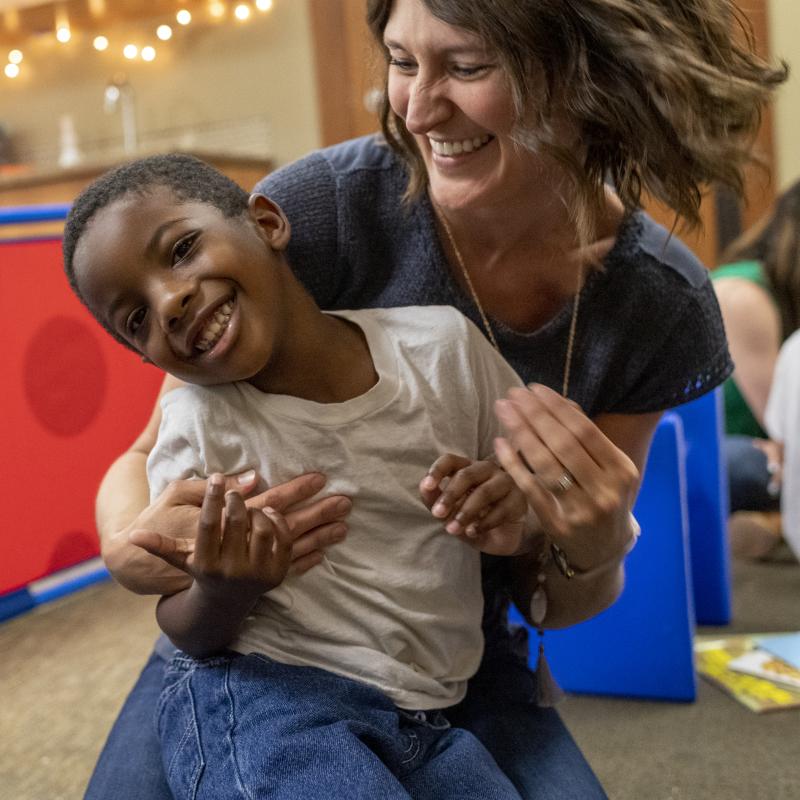A Place Where Families Feel Understood.
St. David’s Autism Day Treatment program supports young children with autism through relationship-based, play-centered therapy. We offer morning and afternoon sessions at our Minnetonka Center, Harley Hopkins Family Center, and at the Harman and Nicollet Centers through culturally responsive programming for East African and Latino children.
Our interdisciplinary team includes mental health therapists, occupational therapists, and speech-language pathologists who collaborate to meet the sensory and relational needs of those with autism in thoughtfully designed spaces that are calming, engaging, and developmentally supportive.
Every child’s journey is unique. That’s why our experienced team partners with families to create individualized treatment plans that reflect each child’s strengths and needs. And we don’t stop there—we walk alongside caregivers too, offering guidance and support as you find your way forward.
2-6 years
Monday-Thursday 4 hours a day
Friday 3 hours
Family Sessions vary by program
Minnetonka Center, Nicollet Center, Harman Center, Harley Hopkins
Morning Session:
Monday-Thursday 8:00 AM - 12:00 PM
Friday 8:00 AM - 11:00 AM
Afternoon Session:
Monday-Thursday 12:00 PM - 4:00 PM
Friday 12:00 PM - 3:00 PM
Eligibility: St. David's team will help assess and match the child with the best program. Our programs are designed for those with Autism Spectrum Disorder or related conditions who quality for intensive services in mental health, occupational therapy or speech therapy.
Our Autism Treatment Programs
St. David's culturally responsive programs include strong representation from the cultural community—among both staff and children—while remaining open to families of all backgrounds.
What the Experience is Like
Where Social Growth Comes to Life
In our small group sessions, children don’t just learn—they connect. Through playful, structured activities, they begin to understand emotions, build friendships, and practice calming strategies in real-world moments that matter.
What this might look like:
- Laughing through a cooperative game
- Practicing deep breaths after a big feeling
- Sharing a toy—and a smile—with a friend
Movement, Mastery, and Sensory Joy
In occupational therapy, children explore their world through movement and touch. Whether they’re climbing, painting, or learning to zip a coat, every activity is a step toward independence and confidence.
What this might look like:
- Swinging high with a therapist’s encouragement
- Scooping beads with tiny fingers
- Washing hands with pride after snack
Finding Their Voice Through Play
Speech therapy is where communication begins to bloom. Through stories, puzzles, and pretend play, children learn to express themselves, connect with others, and feel understood.
What this might look like:
- Roaring like a lion during story time
- Asking for “more blocks” with a proud smile
- Creating a world with toy animals and big imagination
Shared Moments, Growing Skills
Large and small group activities help children stretch their social muscles in safe, supported ways. Whether it’s a nature walk or a shared art project, these moments deepen relationships and spark joy.
What this might look like:
- Painting side-by-side with a new friend
- Listening to a story under a cozy blanket
- Holding hands on the trail, just because
Meals That Nourish More Than Bodies
Snack and lunch times are rich with learning. Children practice asking for what they need, using utensils, and joining in table conversations—all while enjoying a nourishing meal.
What this might look like:
- “Please pass the crackers” said with growing confidence
- Clinking spoons in a shared rhythm
- A quiet moment of connection over lunch
Moments of Calm, Bursts of Joy
Sensory and behavioral supports are woven throughout the day to help children feel grounded and ready to engage. Calming songs and joyful hallway races, these moments meet each child’s needs and gifts with intentionality and care.
What this might look like:
- Swaying to soft music with a weighted vest
- Giggling during a hallway sprint
- A gentle hand massage with lavender lotion
Play That Builds Connection
In the gym or on the playground, children explore, take risks, and build relationships. Staff model play, coach interactions, and celebrate every small victory.
What this might look like:
- Climbing to the top of the slide with a cheer squad of teachers and friends below
- Starting a game of tag with a new friend
- Sitting side-by-side in the sandbox, sharing stories in the sand
What Families Say
Ready to Learn More?
Frequently Asked Questions
We welcome children ages 2 to 6 into our Autism Day Treatment programs.
It really depends on each child’s needs, but most children attend for about 12 to 18 months.
Nope! You can get on the waitlist and schedule an assessment with our team to explore next steps.
We lead with the Greenspan Floortime Approach® and SCERTS, two relationship-based models that focus on emotional development, communication, and meaningful connection. These approaches help us meet each child where they are—through play, curiosity, and trust.
We don’t use Applied Behavior Analysis (ABA) in our programming.
We don’t provide transportation directly, but your child may qualify for non-emergency medical transportation through insurance. Some school districts may also help. Most families arrange their own rides, but we are here to support!
As the Midwest Regional Greenspan Floortime Training Center, we use the Floortime model to meet each child where they are—honoring their unique strengths, challenges, and ways of connecting. We also integrate the Social Communication, Emotional Regulation, and Transactional Support (SCERTS) framework to guide assessment and treatment, supporting social communication, emotional regulation, and meaningful relationships.
Learn Dr. Stanley Greenspan Floortime for Professionals and Parents
